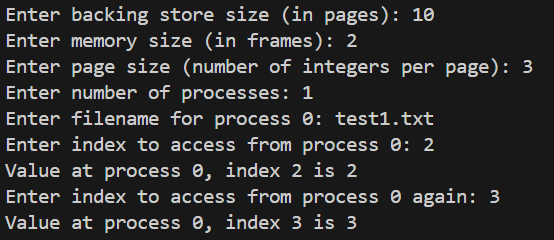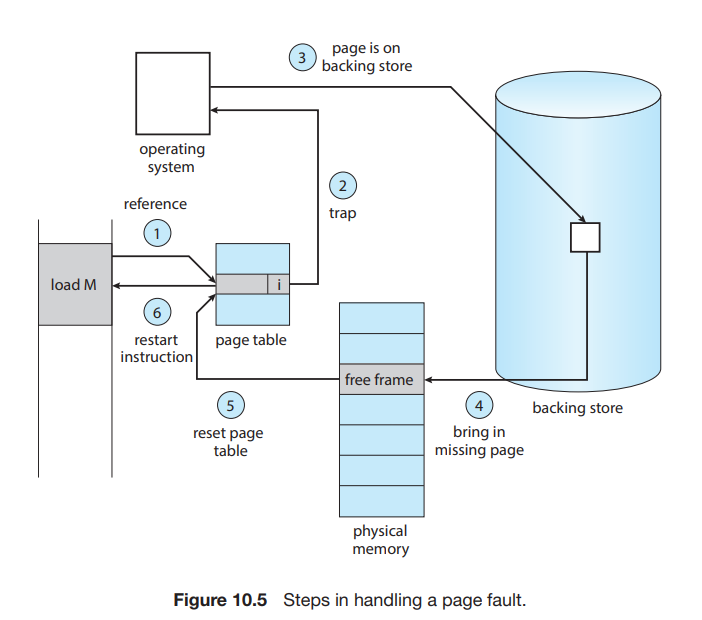Simulation of pagination in C
Create an app that simulates physical memory, backing store, page fault and LRU
Read Chapter 9 Main Memory and Chapter 10 Virtual Memory from the Operating System Concepts before trying to solve this problem. This exercise is for learning about memory, don't use any generative AI tool to solve it.
To run a process, we need more than just the code. It is also required a process control block, thread control block, a scheduler, a dispatcher, system calls to switch to kernel mode, a place in RAM to store data, and many more.
For our pagination simulation, we’ll work with:
- A process (list of integers)
- Physical memory
- Backing store
- Page table
- Frame map
Task:
Implement a get_value(process_id, index) function that returns the integer at the given index for the specified process.
However, the process is split into pages and stored in a backing store. When get_value is called, we must check if the page is in memory:
- If not, load it into a free frame.
- If no frame is free, evict the least recently used (LRU) page and load the necessary one.
All data must be accessed through the physical memory simulated.
The exercise is made just for reading the data.
Complete the three functions found at the of the memory.c:
- handle_page_fault
- get_value
- update_lru
Optional:
Create a function that writes in the memory. Make sure to change handle_page_fault to write data frame into the backing store.
Input
BACKING_STORE_SIZE(max pages in the backing store)MEMORY_SIZE(number of frames in memory)PAGE_SIZE(integers per page)NUM_PROCESSES(number of processes)- For each process, a filename containing its list of integers.
Example
Given a file test1.txt:
0 1 2 3 4 5 6 7 8 9
Compile and run:
gcc -o program main.c process.c backing_store.c memory.c
./program
You will see an output similar to the provided image after you finish the problem.

To run tests:
gcc -o test memory.c process.c backing_store.c test.c
./test
Skeleton explanation
How do we store the data?
All the structures from the code:
// Page Table Entry
typedef struct {
int frame_number;
bool valid;
// For LRU, we might store a 'last_used' counter or timestamp here or separately.
unsigned long last_used;
} page_table_entry;
// Process Structure
typedef struct {
int process_id;
int *data; // Array of integers read from file
int data_count; // How many integers in this process
int pages_count; // How many pages the process has
page_table_entry *page_table;
} Process;
// Backing Store Page
typedef struct {
int process_id;
int page_number;
int *page_data; // array of integers of size page_size
} BackingStorePage;
// We'll need a reverse mapping: frame -> which process/page is currently held there
typedef struct {
int process_id;
int page_number;
} FrameMap;
Global data:
// Global configuration variables
extern int BACKING_STORE_SIZE; // number of pages total in backing store (input by user)
extern int MEMORY_SIZE; // number of frames in physical memory (input by user)
extern int PAGE_SIZE; // number of integers per page (input by user)
extern int NUM_PROCESSES; // number of processes
// Arrays / Global pointers
extern Process *processes;
extern BackingStorePage *backing_store;
extern int **physical_memory; // physical_memory[i] is an array of int[PAGE_SIZE] representing a frame
// For LRU, we will have a global counter to track "time" or accesses
extern unsigned long global_time_counter;
How do we create a process?
The code is in the process.c
Pseudocode is like this:
- create an object process and assign an id to it
- open the file
- simulate a stl mechanism and add here the numbers. (allocate dynamically a fixed size and if it is full, reallocate double the current size)
- calculate data_count, pages_count (make sure to calculate the internal fragmentation)
- allocate memory to page_table and initialize each value as followed:
- frame_number = -1
- valid = false
- last_used = 0 (useful for LRU, if a page has the smallest number, it is the least used)
How do we create the backing store?
The code is in the backing_store.c
Pseudocode for create_backing_store() which is created one time after we know the page size and before get_value:
- see how many pages we need to satisfy the size of the processes and exit if we don't have enough space
- allocate space for the backing store (using the struct BackingStorePage)
- Get each process and put them into the backing store:
- be careful with (the copy of the *data into the page_data. You can use the base + limit technique from chapter 9)
- be careful with the internal fragmentation (allocate as 0)
Pseudocode for load_page_from_backing_store which is used to load from backing store to the main memory:
- get the page number and process_id (because we have some metadata in the backing store)
- find the page with those numbers
- copy to the frame
- Make sure to check if it is not found a page.
How do we create the main memory and how do we get the frame number?
The code is in the memory.c
Pseudocode for init_physical_memory() appellation after creating the backing store:
- allocate memory (MEMORY_size of pointers)
- allocate for each block (PAGE_SIZE of integers)
- create the frame map (we need to know what process and page_number are in each frame)
Pseudocode for get_frame_for_page() which returns the frame number where it is located:
- find the process with that id (any search algorithm)
- get the page table
- Important to update the appearance for LRU detection
- return the frame number for which corresponds to the page (if it is valid)
- if it is not valid, the data is not in memory, and we return -1, which causes a page fault.
How do we select the frame that should be deleted with the LRU algorithm?
The code is in the memory.c
Idea for select_victim_frame():
We have a global value: global_time_counter. Each time we add a new frame to the main memory OR
we access a frame from the memory we add +1 to this variable,
thus the frame with the smallest number is the least used one.
Tips for the functions
💡 handle_page_fault
When a page is not in the main memory, the handle_page_fault should be triggered in the get_value. Remember that we can see if a page is not in a frame with get_frame_for_page() == -1.
This function should:
- find a free frame
- if it is not found
select a victim frame- see what process and page is in that frame
- change the page_table of that process (the valid number and the frame number)
- now you have a free frame
- if it is not found
- Now load from the backing store the page itself
- Update in the end the page table of the process and the frame map.
As a visual representation, look at the following image:

💡 get_value
In the end, the function should return the value requested by the user (the value from an index)
The function should:
- calculate the page number and offset.
- Find the process
- Verify if the process exists (use: exit(2);)
- Verify if the user wants to access a value out of its range (use: exit(3);)
get the frame number from process page table(you have a function for this)- Make sure to verify if there is a page fault
- return directly from the memory value (physical_memory[frame][offset])
💡 update LRU
Find where the function is needed.
Idea: add +1 to the global_time_counter to the page from the process given.
Solution
Check only, don't cheat 😠
void handle_page_fault(int process_id, int page_number) {
// Need to find a free frame or evict a victim
int frame = find_free_frame();
if(frame == -1) {
// No free frame, select victim
frame = select_victim_frame();
// Evict victim
int vic_proc = frame_map[frame].process_id;
int vic_page = frame_map[frame].page_number;
// Mark that page table entry as invalid
// Find that process
Process *vproc = NULL;
for(int i=0; i<NUM_PROCESSES; i++){
if(processes[i].process_id == vic_proc) {
vproc = &processes[i];
break;
}
}
vproc->page_table[vic_page].valid = false;
vproc->page_table[vic_page].frame_number = -1;
}
// Load the requested page into this frame
load_page_from_backing_store(process_id, page_number, physical_memory[frame]);
// Update page table entry
Process *p = NULL;
for(int i=0; i<NUM_PROCESSES; i++){
if(processes[i].process_id == process_id) {
p = &processes[i];
break;
}
}
p->page_table[page_number].valid = true;
p->page_table[page_number].frame_number = frame;
p->page_table[page_number].last_used = ++global_time_counter;
// Update frame map
frame_occupied[frame] = true;
frame_map[frame].process_id = process_id;
frame_map[frame].page_number = page_number;
}
int get_value(int process_id, int logical_index) {
// Determine which page and offset
int page_number = logical_index / PAGE_SIZE;
int offset = logical_index % PAGE_SIZE;
// Ensure page_number < process_pages_count
Process *p = NULL;
for(int i=0; i<NUM_PROCESSES; i++){
if(processes[i].process_id == process_id) {
p = &processes[i];
break;
}
}
if(!p) {
fprintf(stderr,"Process %d not found\n", process_id);
exit(2);
}
if(page_number >= p->pages_count) {
fprintf(stderr,"Access out of range (process %d, index %d)\n", process_id, logical_index);
exit(3);
}
int frame = get_frame_for_page(process_id, page_number);
if(frame == -1) {
// Page fault
handle_page_fault(process_id, page_number);
frame = p->page_table[page_number].frame_number;
}
return physical_memory[frame][offset];
}
void update_lru(int process_id, int page_number) {
// Just update the last_used to current global_time_counter
Process *p = NULL;
for(int i=0; i<NUM_PROCESSES; i++){
if(processes[i].process_id == process_id) {
p = &processes[i];
break;
}
}
p->page_table[page_number].last_used = ++global_time_counter;
}
What we learned:
We learned how the pagination works, and how we can manage a process that has more pages than frames available in RAM.
Moreover, a concept seen in the code is Thrashing.
Look at the get_value function and observe that if we don't have the page in the memory, there is a page_fault. If every value we call with get_value is on a different page, we will do a page fault every time, thus handle_page_fault() will be called when we want a value from memory, which is costly.